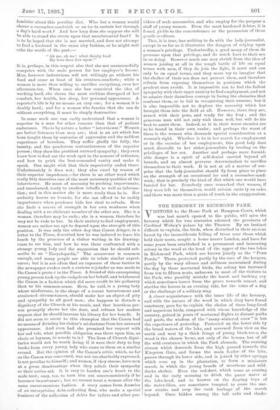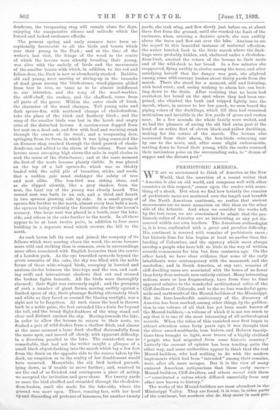THE HERONRY IN RICHMOND PARK.
VISITORS to the Home Park at Hampton Court, which was last month opened to the public, will miss the heronry which for two centuries adorned the precincts of Cardinal Wolsey's palace by the Thames. By an instinct difficult to explain, the birds, when disturbed in their ancient haunt by the inconsiderate felling of trees near those which held their nests, sought a home nearer London, and have for some years been established in a permanent and increasing colony in the wood at the head of the upper of the two lakes in Richmond Park, which are known jointly as the "Penn Ponds." There, protected partly by the care of the keepers, partly by the wary silence and stillness maintained during the day by these nocturnal birds, the colony has increased from ten to fifteen nests, unknown to most of the visitors to the Park, who possibly mistake the harsh and barking cry which sometimes issues from the grove towards sunset, and startles the horses in an evening ride, for the voice of a dog or the challenge of a solitary stag.
A closer acquaintance with the inner life of the heronry, and with the nature of the wood in which they have found sanctuary, goes far to explain the choice of these long-lived and sagacious birds, compared with whose knowledge of the country, gained in years of nocturnal flights to distant parks and pools, the wisdom of the "many-wintered crow" is but the experience of yesterday. Protected on the lower side by the broad waters of the lake, and screened from view on the south and west by a thick fringe of young birch-treee, the wood is the chosen home, not only of the herons, but of all the wild creatures in which the Park abounds. The running stream which descends from the high ground towards the Kingston Gate, and forms the main feeder of the lake, passes through its lower side, and is joined by other springs which ooze up in the plantation, to form a miniature marsh, in which the young broods of moorhens and wild- ducks shelter. Even the red-deer, which come at evening and in the early morning to drink the purer water at the lake-head, and to browse on the floating tops of the water-lilies, are sometimes tempted to cross the nar- row straits and crop the rank herbage of the marsh beyond. Once hidden among the tall oaks and rhodo- dendrons, the trespassing stag will remain alone for days, enjoying the comparative silence and solitude which the fenced and locked enclosure affords.
The present spring and early summer have been ex- ceptionally favourable to all the birds and beasts which rear their young in the Park ; and at the time of the writer's last visit, the fringe of the wood in the centre of which the herons were silently brooding their young, was alive with the melody of birds and the movements of the smaller beasts with which, in addition to the red and fallow-deer, the Park is now so abundantly stocked. Rabbits, old and young, were moving or sitting-up in the tussocks of dead grass among the birch-stems, wood-pigeons glided from tree to tree, so tame as to be almost indifferent to our intrusion, and the song of the wood-warbler, the chill-chaff, the cuckoo, and the chaffinch, came from all parts of the grove. Within the outer circle of birch, the character of the wood changes. Tall young oaks and dark spruce-firs, with scattered clumps of rhododendron, take the place of the thick and feathery birch ; and the song of the smaller birds was lost in the harsh and angry cries of the disturbed herons. A carrion-crow flapped from her nest on a dead oak, and flew with loud and warning croak through the centre of the wood ; and a trespassing deer, springing from its form, in which it was lying concealed like an Exmoor stag, crashed through the thick growth of rhodo- dendrons, and added to the alarm of the colony. Four male herons came sweeping high above the oaks in rapid circles to seek the cause of the disturbance ; and at the same moment the first of the nests became plainly visible. It was placed on the top of a tall spruce-fir, which was so thickly loaded with the solid pile of brambles, sticks, and reeds, that a sudden gale must endanger the safety of tree and nest alike. The hen-bird was sitting close, and as she slipped silently, like a grey shadow, from the nest, the faint cry of the young was clearly heard. The second nest was built in an oak, and a third and fourth in two spruces growing side by side. In a small group of spruce-firs further to the north, almost every tree held a nest, the spruces being evidently the favourite site for the heron's nursery. One large nest was placed in a beech, near the lake- side, and others in the oaks further to the north. In all there appear to be at least twelve pairs, in addition to four more building in a separate wood which crowns the hill to the north, As each heron left its nest and joined the company of its fellows which were soaring above the wood, the scene became more wild and striking than is common, even in surroundings more often associated with English heronries than the centre of a London park. As the eye travelled upwards beyond the green summits of the oaks, the sky was filled with the noble forms of these wide-winged birds, sweeping in hurried and anxious circles between the tree-tops and the sun, and cast- ing swift and intermittent shadows that cut and crossed the broken lights beneath. All the birds were thoroughly alarmed ; their flight was extremely rapid ; and the grouping of such a number of giant forms, moving swiftly against a limited space of sky, their plumage flashing alternately black and white as they faced or crossed the blazing sunlight, was a sight not to be forgotten. At such times the head is thrown back in a noble poise, the feet extended like a train far beyond the tail, and the broad flight-feathers of the wing stand out clear and distinct against the sky. Moving.towards the lake, in order to allow the herons to return to their nests, we flashed a pair of wild-drakes from a shallow ditch, and almost at the same moment a lame duck shuffled distressfully from the same spot, and moved off slowly, with apparent difficulty, in a direction parallel to the lake. The counterfeit was so remarkable, that had not the writer caught a glimpse of a small black object dashing into the marsh which lay a few feet from the drain on the opposite side to the course taken by the duck, no suspicion as to the reality of her disablement would have occurred. Meanwhile, the old bird invited pursuit, lying down, as if unable to move further; and, resolved to see the end of so finished and courageous a piece of acting, we accepted the invitation and gave chase. For twenty yards or more the bird shuffled and stumbled through the rhododen- dron-bushes, until she made for the lake-aide, where the ground was more open. There, running fast, with her head up and discarding all pretence of lameness, for another twenty yards, she took wing, and flew slowly just before us, at about three feet from the ground, until she reached the limit of the enclosure, when, uttering a derisive quack, she rose swiftly above the trees and flew out over the lake. Anxious to see the sequel to this beautiful instance of maternal affection, the writer hurried back to the little marsh where the duck- lings were probably hidden, and, sheltered under a rhododen- dron-bush, awaited the return of the herons to their nests- and of the wild-duck to her brood. In a few minutes she reappeared, flying swiftly in circles among the trees, and after satisfying herself that the danger was past, she alighted among some wild-currant bushes about thirty yards from the marsh. There she stood for a moment, still and listening,. with head erect; and, seeing nothing to alarm her, ran bust- ling down to the drain. After realising that no harm had overtaken her brood on the spot where they had been sur- prised, she climbed the bank and tripped lightly into the- marsh, where, in answer to her low quack, we soon heard the piping voices of the ducklings, which till then had remained motionless and invisible in the few yards of grass and rushes. near. In a few seconds the whole family were united, and we had the pleasure of seeing the old bird swim past at the head of an active fleet of eleven black-and-yellow ducklings, making for the centre of the marsh, The herons also recovered from their alarm, the hen-birds returning one by one to the nests, and, after some slight endearments, settling down to brood their young, while the cocks resumed their motionless poise on the surrounding oaks, to " dream of supper and the distant pool."



































 Previous page
Previous page